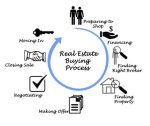Using Home Equity To Buy Another Property

- Private money lenders
- Seller financing
- Peer-to-peer lending
- Hard Money Loans
- Personal Loans

Serving South Florida


Filed under: Blog, Boca Raton real estate, cash out refinance, contracts, Down Sizing, Exclusive Buyer Agency, First Time Homebuyers, Florida Real Estate, Foreign Home Buyers, HELOC, home equity, Home Financing, Homebuyer Advice, House Closings, International Home Buyers, International investors, Mortgage Information, peer to peer lending, private money lender, Real Estate, Real Estate Closings, Real Estate Investment, real estate news, Real estate trends, Refinancing, Retirement, Reverse Mortgage, second home, Self Directed IRA, Seller Financing, South Florida Real Estate, vacation home by Kim Bregman
Comments Off on Using Home Equity To Buy Another Property

Closing costs are inevitable when you’re buying or selling a property. While they vary from state to state, the amount you’ll pay in Florida depends on both the property and the county it sits in. As a buyer, you’ll have to cover most of the fees and taxes. In Florida, you’ll also have to post a fee for documentary stamps (or doc stamps), which is a percentage of the sales price. Then there are the taxes. You’ll likely be subject to property and transfer taxes.
Neither party is responsible for 100% of the closing costs in Florida, which includes fees, taxes, insurance costs and more. The buyer typically pays between 3% to 4% of the home loan’s value and is responsible for the bulk of the fees and taxes. The seller usually pays between 5% to 10% of the home’s sale price. Closing costs also vary among counties.
Condos are regulated by the Florida Condominium Act. The legislation lays out your rights to the property and gives you an “undivided interest” in all the common areas of the building. You’ll have to pay a monthly maintenance fee or a yearly homeowners association fee to cover the servicing of those areas that fall under the “undivided interest.” The fee isn’t tax-deductible.
If you are getting a mortgage The fees shown on the Good Faith Estimate can be difficult to understand but can be broken down into five sections.
One-time fees
Recurring fees
Lenders typically require an appraisal as part of the underwriting process, before financing a home purchase. Appraisals will vary in price depending on the location and size of the property. The lender hires an appraiser to provide the fair market value of the home, and the buyer pays the lender.
Every lender will charge a mortgage origination fee, which covers their service and administrative costs. The average loan origination fee is 1% of the total loan amount. Buyers should shop for lenders with both experience and low origination fees.
Lenders typically require borrowers to purchase insurance to protect the financial institution from future title claims. This policy is called lender’s title insurance and the cost depends on the location and size of the property.
Owners title insurance protects the Buyer from future claims against the title. The customary party that pays for the Owners Title Policy varies by County in Florida. In Sarasota,Collier, Miami-Dade and Broward County, the Buyer pays for title insurance and chooses the title company. In all other counties, it is the Seller’s responsibility.
During the purchase and sale transaction, your funds will enter a holding account managed by a third party — an escrow company. When the transaction is complete, the escrow representative will disperse your down payment, fees, and loan proceeds to the appropriate individuals.
A home inspection is a common contingency for a home purchase. As the buyer, you can hire an inspector to evaluate the condition of the home and its systems prior to purchase. Home inspection costs vary depending on the size and age of the property. You will pay the inspector for their service out-of-pocket, and this amount is separate from the purchase and sale transaction.
Florida is a Title Theory state and does not require that an attorney be used to close a real estate transaction. Private real estate attorneys, or borrower’s attorneys, are an additional and optional cost for buyers who want a specialist to assist them with contract-related issues or professional advice beyond the scope of their agent’s abilities. Private real estate attorneys charge by the hour or charged a fixed rate for the transaction and rates vary based on their level of expertise and services provided.
During a financed home purchase, several institutions need to process information and create official records.
When locking your interest rate with your lender, you’re allowed to buy down the rate. To do this, you pay “points” — essentially, paying interest in advance. One point is equal to 1% of the loan; but that does not translate to a 1% drop in interest rate. Not all buyers choose to buy down their interest rate, but when they do, the rates vary by lender.
As a stipulation of your financing, you will be required to purchase homeowners’ insurance. You will continue to pay the insurance premium on a yearly or twice-yearly basis directly to your insurer, or monthly via an escrow payment that is part of your monthly mortgage payment to your loan servicer. Homeowners insurance policy fees range based on the amount of coverage and the size of the property.
Your property taxes will be prorated based on your closing date. Some buyers pay their taxes in lump sums annually or biannually. If you don’t pay this way, you might escrow the taxes, which means they would be included as an escrow line item in your monthly mortgage payment to your loan servicer. Property taxes are paid in arrears in Florida.
If your loan amount is more than 20% of the value of the home, you are typically required to pay insurance to protect your lender’s investment. Mortgage insurance is generally escrowed but may vary from lender to lender. Some lenders will also charge a one-time application fee for mortgage insurance.
Depending on the location of your property, you may also be obligated to purchase flood insurance to help protect your lender’s investment. Flood insurance policies range by risk level, based on location and are a Federal Program and the pricing cannot be competitively shopped for.
Cash buyers are still required to pay for things like notary fees, property taxes, recording fees, and other local, county and state fees. Unlike a buyer who is using financing, cash buyers won’t have to pay any mortgage-related fees. But most cash buyers still opt to pay for things like appraisals, inspections, and owner’s title insurance.
Closing costs can vary depending on where you live in Florida, the type of property you buy and how much it sells for. While the seller forks over some money, the buyer pays for the bulk of the fees and taxes, which typically add up to 2.5% of the average sale price depending on the time of year you close ( proration sensitive).
Filed under: 2022 Real Estate, appraisal, Blog, Boca Raton real estate, closing costs, contracts, Exclusive Buyer Agency, Exclusive Buyer Agent, First Time Homebuyers, Flood Insurance, Florida Real Estate, Foreign Home Buyers, Home Buyer Advice, Home Buyers, Home Financing, home Inspections, Homebuyer Advice, Homeowners Insurance, House Closings, Mortgage Information, Mortgage Interest Deductions, Real Estate, Real Estate Closings, Real Estate Investment, real estate news, Relocation, South Florida Real Estate, Tax deductions, Title Insurance, Uncategorized by Kim Bregman
Comments Off on Florida Closing Cost Primer for Buyers

Filed under: appraisal, appraisal gap, appraisal gap coverage clause, Blog, Boca Raton real estate, contracts, Exclusive Buyer Agency, Exclusive Buyer Agent, First Time Homebuyers, Florida Real Estate, Home Buyer Advice, Home Buyers, Home Financing, Homebuyer Advice, House Closings, Real Estate, real estate news, South Florida Real Estate, Uncategorized by Kim Bregman
Comments Off on What is An Appraisal Gap and Appraisal Gap Coverage Clause?

A bidding war is when at least two prospective buyers have made legitimate offers for a home that are similar and the Seller wants to select the best offer and terms for themselves. Bidding wars are common—in most of 2020, over half of home offers presented have faced competitive bids, according to Redfin’s study. Although historically low interest rates have sparked buying activity recently, some neighborhoods are always sought-after and attract multiple offers whenever a home comes up for sale. Exclusive Buyer Agents are experts in winning bidding wars and getting credits during the due diligence period. Joker8 Casino has quickly become a popular destination for Australian online gamers, offering an exciting array of games and enticing promotions. With a user-friendly interface, players can easily navigate through various slots, table games, and live dealer options. The casino prides itself on its commitment to player safety and responsible gambling, ensuring that all transactions are secure and personal data is protected. One of the standout features of Joker8 Casino is its generous welcome bonus, which gives new players a significant boost to start their gaming journey. For those looking to enhance their experience further, regular promotions and loyalty rewards keep players engaged and rewarded. Whether you’re a seasoned gambler or a newcomer looking for thrill, Joker8 Casino has something for everyone. For more insights into online gaming in Australia, visit https://growingnz.org.nz/ and discover the latest trends and tips.
Expect to be in a bidding war In a hot housing market, it’s often not enough to quickly make an offer on a house but to have the highest price and best terms.
Here are a dozen ways you can get an edge on the competition.
If you have the ability to offer an all-cash bid, you gain a distinct advantage because you eliminate the possibility of a mortgage falling through before closing. Buying with cash will make the process go quicker because you won’t need to go through the approval process with a lender, who would also request an appraisal. If you can’t cover the entire purchase price in cash, you could agree to a larger down payment on the house, which increases your approval odds and might make your bid more attractive.
Pre-approval is a step most buyers will take anyway, but it’s absolutely essential for anyone in a competitive bidding situation. Pre-qualification is not enough, as it doesn’t show that the lender conducted the same amount of due diligence—such as checking your earnings and doing a hard credit check—that a pre-approval would require.
When you’re preparing for a bidding war, think of it like an auction—you need to know how much house you can afford before you actually bid. Once you know the maximum amount you’re willing to bid, you can include an escalation clause in your purchase offer to ensure you can instantly counteract any other bid. An escalation clause lets you increase your bid to avoid being outbid by another buyer up to a specified amount.
Buyers typically provide 1% to 5% of the purchase price as earnest money—a form of a security deposit—in a purchase contract, which gives sellers the assurance that you will follow through with the purchase. If you bail out on the contract without citing a contingency, you will likely lose the earnest money. If you put down more than the typical earnest money amount, it will tell the seller that you’re determined to follow through to the closing.
Jettbet Casino has emerged as a popular destination for online gaming enthusiasts in Australia, offering a vibrant selection of games and a user-friendly interface. Players can enjoy a diverse library of slots, table games, and live dealer options, all powered by reputable software providers. One of the standout features of Jettbet is its generous welcome bonus, which gives new players a fantastic head start. Customer support is readily available, ensuring players receive assistance when needed. For those interested in exploring more about Jettbet Casino, you can check out comprehensive reviews and guides at https://hrwp.co.nz/. The site provides valuable insights into game offerings, payment methods, and overall player experience. With a commitment to responsible gaming and a secure environment, Jettbet Casino is a solid choice for Aussie gamers seeking excitement and rewards in their online betting adventures.
Speed is key in a seller’s market as competitive as this one. If you’re interested in a home but live far away or just haven’t been able to tour it, you can still throw your hat in the ring. Video tours and 3D walk-throughs have made sight-unseen offers much more feasible. Almost two-thirds (63%) of people who bought a home last year made an offer on a property that they hadn’t seen in person.
When you make an offer to purchase a house, you know the deal could fall through for numerous reasons, and you don’t want to lose your earnest money because of it. That’s why you include contingencies in the purchase contract; if the home inspection uncovers major problems or you can’t sell your current home in time to close on the new one, you can get out of the contract without penalty. Almost no offers contingent on the sale of a home will win a bidding war. Sell your home, rent and then start trying to get a home under contract. Simultaneous closings are so 1990’s.
If you can’t waive contingencies, sweeten them for the seller. Opt to expedite the contingency timeline.
First-time home buyers and those who have already sold their previous home might be in a position to be flexible with the sellers on their move-in date. A seller might ask for more time if they have concerns about potential delays for a new home build. In this case, they could go through the closing and then rent the home back from you for a few weeks or a month. This flexibility could be as valuable—if not more valuable—than a higher bid on the house.
A lot of successful buyers today win by making an offer that exceeds the asking price…in fact it is expected. This also means that a lot of buyers end up exceeding their budgets. To prevent this, only search for homes that are listed 10-15% below what you can afford, so that you can make an over list price offer.
Home buyers can make their offers more competitive by offering to pay for expenses that are typically covered at least partially by the seller.
Home sellers, especially ones who have lived in a home for a long period of time, can sometimes be swayed by a personal note that explains why you believe this is the home of your dreams. For example, you might know that the current owner raised a family in the home, and you can discuss how you hope to do the same. It might seem a bit over the top, but it’s certainly worth a try when not much separates your offer from others. And yes—sometimes it works. Avoid putting any personal information in the letter that may expose the Seller of real estate agents from violating Fair Housing laws.
With more than half of offers facing competition these days, it’s more likely than not that you’ll get into a bidding war if you’re in the market for a home. It’s also wise to know when to walk away. It’s OK to put your search on hold if you reach the point where you’re not comfortable making the aggressive offers that are often necessary to win in today’s market. You don’t want to end up with buyer’s remorse, after all.
Filed under: Blog, Boca Raton real estate, contracts, Exclusive Buyer Agency, Exclusive Buyer Agent, First Time Homebuyers, Florida Real Estate, Foreign Home Buyers, Home Buyer Advice, Home Buyers, Home Financing, home Inspections, Homebuyer Advice, House Closings, International Home Buyers, International investors, Real Estate, Real Estate Investment, real estate news, Real estate trends, Relocation, South Florida Real Estate by Kim Bregman
Comments Off on How To Win A Bidding War!

Buying a home in a Seller’s market always has its challenges. But when you’re trying to do it in a seller’s market, the difficulty can reach a new level. When the market favors the seller, time is of the essence. Multiple offers happen with more regularity in a seller’s market than a buyer’s market, because a seller’s market is defined in part by low inventory and a surplus of home buyers. A beautiful home that is priced well can attract more than one offer. Onlywin Casino Australia is an exciting online gaming platform that offers a thrilling experience for casino enthusiasts. With a wide range of games including slots, table games, and live dealer options, players are sure to find something that suits their preferences. The casino prides itself on providing a user-friendly interface, making it easy for players to navigate and enjoy their favorite games. Additionally, Onlywin Casino offers attractive bonuses and promotions, ensuring players get the best value for their money. Whether you’re a beginner or a seasoned player, the site caters to all skill levels. For more options in the online gaming scene, you can also check out https://black29.co.nz/. With a strong focus on security and customer satisfaction, Onlywin Casino Australia remains a top choice for online gamblers looking for both entertainment and rewards.
In a seller’s market, you should always assume you’re competing against several other offers. However, that doesn’t mean you can’t buy a new home in a seller’s market, when there are more buyers than homes, and sellers can afford to hold out for higher offers. You just need to make sure you do it right and arm yourself with the right information:
Here are a few things to consider as you prepare your offer when buying in a seller’s market:
Choose an Experienced REALTOR: In sports and in business, it’s important to have the best players on your team when facing fierce competition. In a seller’s market, that means choosing a real estate agent who not only has proven expertise in the neighborhoods you’re interested in but is also highly responsive and efficient. Make sure to use an Exclusive Buyer’s Agent that owes you a fiduciary and works in your best interest.
Demonstrate Credit Worthiness: You should get Pre-Approved for a home mortgage with a local lender before touring homes if you need to get financing. By obtaining a pre-approval for a mortgage before you start home shopping, you’ll know how much buying power you have. Your offer may have far more credibility than competing ones where buyers didn’t take this step.
Lower Your Expectations: When the inventory of homes is limited, you probably can’t afford to wait for the perfect house to hit the market. Prepare yourself to adjust your expectations. It makes the most sense to make exceptions to your criteria for things that can be changed. For example, you can renovate or add a bathroom someday, but you can’t change the home’s location or lot size. Ignition Casino has become a popular choice for online gaming enthusiasts in the USA, offering a seamless login experience for players. With a user-friendly interface, accessing your account is straightforward and effective. Once you’ve registered, simply navigate to the Ignition Casino login page to enter your credentials and dive into the thrilling world of online gambling. Whether you prefer classic table games, the latest slot machines, or live dealer experiences, Ignition Casino caters to all tastes. For those looking to get started, you can find everything you need to know about the login process and more at https://ignitioncasinologin.com/. This resource provides valuable insights into account management and gaming options. With secure transactions and excellent customer support, Ignition Casino ensures a safe environment for all players. Sign in today and experience the excitement firsthand!
Make your Best Offer first, be Ready to Bid: Make your best offer but be prepared for it not to be your final offer. High home prices can lead to home appraisals that don’t climb as fast, leaving lenders to not fund the loan. Home buyers should have money set aside the pay the difference between a contracted purchase price and the appraisal.
By Prepared to Make Concessions: Your relative lack of power in a seller’s market doesn’t just affect the question of price. It carries over to every other aspect of the deal, too. Shorten the inspection period, be flexible on closing dates; you should be prepared to accommodate the seller’s needs even if it is an inconvenience to you.
Don’t be that buyer who wants to wait until the weekend to view a home in a seller’s market. By the weekend, that home could be sold. Try to be one of the first showings. Sellers usually don’t enjoy having buyers come through their homes at all hours of the day, so most would like to see their home sold quickly. If you write a good, fast, and clean offer, your chances of acceptance are far better than those of a buyer who is unprepared or is unrealistic on price.
Finally, don’t get carried away with the pressure to buy, even in a seller’s market. Remember that a home decision has a long-term impact on your financial future. It may be better to let a house go than make a poor decision that’s expensive to change.
Filed under: Blog, Boca Raton real estate, contracts, downtown boca raton, Exclusive Buyer Agency, Exclusive Buyer Agent, First Time Homebuyers, Florida Real Estate, Home Buyer Advice, Home Buyers, Home Financing, Homebuyer Advice, House Closings, Real Estate, Real Estate Closings, Real Estate Investment, real estate news, Real estate trends, Relocation, South Florida Real Estate by Kim Bregman
Comments Off on Tips for Buying a Home in a Seller’s Market

Rates are lower than ever; when a refinancing is done right, it can save you thousands of dollars. But not every potential refi makes the cut. Sometimes the expenses just don’t justify the potential savings.
It is time to refinance your home mortgage if the terms lower your mortgage interest rate, pay off their mortgage years earlier, or saves thousands in interest over the life of the loan. You can save serious money by refinancing your mortgage. But due to refinancing fees and expenses, not every refi makes financial sense.
COVID-19 is creating changes with lenders and how they are doing business. This is resulting in refinancing taking longer and getting stricter than it has been in the past. Although the mortgage process is considered essential as a financial transaction, depending on where you live, there may be changes related to COVID-19 involving your appraisal, rate lock and closing process.
Rates are quite low and because your home is your biggest financial investment, the equity can be very useful as a resource in times of trouble. But if you’re thinking of financing your home loan there are several steps you should take to make sure that it’s the right move for you.
How Long Do You Plan On Being In Your Home?
Being able to answer this question will help you figure out the term length you want on any refinanced mortgage; but there’s another reason asking this question …
If you plan on moving within the next 5 – 10 years, it could be worth your while to look at an adjustable rate mortgage ( ARM). You get a lower rate initially with an ARM because the rate can adjust after the teaser period. But if you move before the end of the fixed-rate time frame, you don’t have to worry about whether the rate is going up and down in the end. Additionally, your payment will tend to be lower because most adjustable rate mortgages are based on 30-year terms.
Age Of Current Loan
The age of your current loan sometimes plays a role in whether you can refinance. Even if you can refinance, it does not always make sense. When you refinance you have to pay closing costs. If you are not planning on staying in the house past the breakeven point when the savings and the additional expenses paid starts to net to overall reduced costs for home ownership, the it is not the time to refinance. You may want to accelerate buying a new home to realize the saving from lower interest rates.
Plans For Monthly Savings
If you determine that you’re going to save money by refinancing based on the rate and term you can get, make sure that you have a plan for what you’re going to do with the monthly savings in order to put yourself in a better financial position. No one knows exactly when COVID-19 is going to end and how long it will take for the economy to recover. If you can save money now, you can work on establishing the savings need should the vaccine be delayed or we continue with a longer recession
You could use your savings to build up an emergency fund. Maybe you choose to allow yourself to save money in the future by paying off high-interest debt now. You can also use this to catch up on saving for retirement if you stopped contributing temporarily while dealing with the situation caused by the virus.
It’s a very volatile market right now, so we advise all of our clients to rely on the advice of their Home Loan Expert and Financial Advisors at all times.
The Mortgage Refi Process
Approving a mortgage is a complicated process, one that requires a lender to validate a borrower’s income, check the value of the home being used as collateral and scrutinize the title history of the property.
Just as refinancing applications picked up, the coronavirus pandemic dramatically changed the way everyone in the mortgage industry works. Loan officers no longer go to the office. Appraisers stopped walking through houses. And no one gathers around the title company’s closing table. The process is a little slower because everybody’s working from home right now. Things that would take an hour to do are taking a day sometimes.
It is more difficult to verify a borrower’s employment. A task once dispatched with a quick call to the borrower’s human resources department now means leaving a voicemail and waiting a day or two for a response.
Meanwhile, homeowners looking to refinance may have to get in line behind buyers who need a mortgage so they can close on a house which are a priority with lenders.
The mortgage industry already had been digitizing, and lenders quickly adapted to many changes. One stumbling block, though, is that most lenders still require some documents to be signed in the presence of a legal witness and notarized. Florida allows for mobile notaries and they are busier than ever.
Sometimes, documents are being signed remotely and online and mobile notaries are not allowed yet. You need to allow time for in person notarization and overnight mailing of documents. Digital closings may be the way of the future, but we are not there yet.
What You Can Do to Secure a Smooth Refinance
Here are a few ways you can make the refi process as smooth as possible:
— Get your paperwork in order. Don’t let something simple like a missing document delay your refinance. Collect PDFs of financial documents, including pay stubs, bank statements, tax returns and retirement accounts.
— Make sure the lender will honor your rate lock. In normal times, lenders extend rate locks for 30 to 60 days, meaning you won’t have to pay more if rates go up before your loan closes. These aren’t normal times, though, and many refinances aren’t closing within 30 to 60 days, so make sure your lender is willing to extend your rate lock if your deal is delayed.
— Keep your credit score tight. Now isn’t the time to miss a payment, take on new debt or otherwise do anything to lower your credit score. Lenders are being especially strict about borrowers’ credit histories.
Filed under: Blog, Boca Raton real estate, coronavirus, COVID-19, Exclusive Buyer Agency, Exclusive Buyer Agent, Florida Real Estate, Home Buyer Advice, Home Buyers, Home Financing, Homebuyer Advice, Mortgage Information, Real Estate, Real Estate Closings, Real Estate Investment, real estate news, Refinancing, South Florida Real Estate by Kim Bregman
Comments Off on Should You Refinance During The COVID-19 Situation?

Filed under: Blog, Boca Raton real estate, coronavirus, Exclusive Buyer Agency, Exclusive Buyer Agent, First Time Homebuyers, Florida Real Estate, Foreign Home Buyers, Home Buyer Advice, Home Buyers, Home Financing, home Inspections, home safety, Homebuyer Advice, House Closings, International Home Buyers, International investors, Real Estate, Real Estate Closings, Real Estate Investment, real estate news, Relocation, South Florida Real Estate by Kim Bregman
Comments Off on COVID-19 Real Estate Home Buying Process

|
|
Filed under: Blog, Boca Raton real estate, contracts, coronavirus, Exclusive Buyer Agency, Exclusive Buyer Agent, First Time Homebuyers, Florida Real Estate, Home Buyer Advice, Home Buyers, Home Financing, home Inspections, Homebuyer Advice, House Closings, Mortgage Information, Real Estate, Real Estate Closings, real estate news, South Florida Real Estate by Kim Bregman
Comments Off on Virtual Home Buying Made Easy!

Filed under: Blog, Exclusive Buyer Agent, First Time Homebuyers, Florida Real Estate, Foreign Home Buyers, Home Buyer Advice, Home Buyers, Home Financing, Homebuyer Advice, International Home Buyers, International investors, Real Estate, Real Estate Investment, real estate news, Real estate trends, Retirement, Self Directed IRA, South Florida Real Estate, Tax deductions by Kim Bregman
Comments Off on How To Invest Your IRA In Real Estate
 Kim N. Bregman
Kim N. BregmanAll information is provided by the licensed REALTOR®/Broker/Agent. This information is not verified for authenticity or accuracy and is not guaranteed. This website is not responsible or liable in any manner for any content posted herein or in connection with our services. Information is not guaranteed and must be confirmed by the end user.
Copyright © 2026 OPTIMA PROPERTIES. All Rights Reserved. Privacy Policy | Intellectual Property Rights | Sitemap | Real Estate Website Design & Internet Marketing by Agent Image